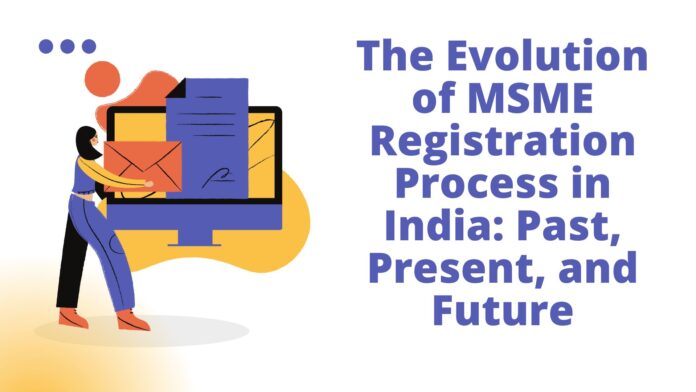Introduction:
Small and Medium Enterprises (SMEs) are the backbone of the Indian economy, contributing significantly to employment generation and GDP growth. The registration process for Micro, Small, and Medium Enterprises (MSMEs) has undergone notable evolution over the years, reflecting the changing needs of businesses and regulatory reforms. This journey, from its inception to its present state and future trajectory, highlights the efforts to streamline processes, promote inclusivity, and foster economic development.
Past:
Historically, udyam Registration processes in India were characterized by bureaucratic hurdles and lengthy paperwork. Entrepreneurs often faced challenges in obtaining registrations, hindering their ability to access benefits and incentives offered by the government. Lack of digitization compounded these issues, resulting in inefficiencies and delays in the registration process. The cumbersome nature of the system acted as a barrier to entrepreneurship and inhibited the growth potential of small businesses.
Present:
In recent years, there has been a significant shift towards simplification and digitization of the MSME registration process. Initiatives such as the Udyam Registration portal have been launched to streamline registration procedures and make them more accessible to entrepreneurs. The introduction of online platforms has reduced paperwork and processing times, enabling faster registration and easier access to government schemes and subsidies. Additionally, the redefinition of MSME classification criteria based on turnover and investment has provided clarity and flexibility to businesses, aligning with the dynamic nature of the economy.
Future:
Looking ahead, the future of MSME registration in India is poised for further transformation. Embracing technology advancements such as blockchain and artificial intelligence can enhance transparency, security, and efficiency in registration processes. Integration with other government databases can facilitate seamless verification of information, reducing the burden on businesses and regulatory authorities. Moreover, initiatives to promote financial inclusion and digital literacy among MSMEs can empower entrepreneurs, fostering a conducive environment for innovation and growth. Collaborative efforts between the government, industry stakeholders, and technology providers will be crucial in shaping a future-ready MSME ecosystem.
Challenges and Opportunities:
While significant progress has been made in simplifying the MSME registration process, challenges persist. One such challenge is the need for greater awareness among entrepreneurs regarding the benefits of registration and the availability of government schemes. Many small businesses remain unaware of the incentives and support mechanisms provided by the government, underscoring the importance of outreach and education initiatives.
Furthermore, ensuring inclusivity remains a priority. While digitization has made the registration process more accessible, there is a need to address barriers faced by marginalized communities, including women entrepreneurs and those in rural areas. Tailored support programs and targeted interventions can help bridge these gaps and promote equitable access to opportunities.
In addition to challenges, there are immense opportunities on the horizon. The MSME sector is poised for growth, driven by factors such as increasing digitization, rising consumer demand, and evolving market dynamics. By leveraging technology and innovation, MSMEs can enhance their competitiveness, expand market reach, and drive productivity gains.
Moreover, the government’s continued focus on initiatives such as ‘Make in India’ and ‘Startup India’ presents avenues for MSMEs to participate in global value chains and capitalize on export opportunities. Facilitating access to finance, fostering entrepreneurship, and nurturing innovation ecosystems will be critical in unleashing the full potential of the MSME sector and propelling India towards its economic goals.
Policy Recommendations:
To further enhance the MSME registration process and support the growth of small businesses, policymakers should consider the following recommendations:
Streamlining Regulatory Frameworks:
Continuously review and simplify regulatory requirements to reduce administrative burden and promote ease of doing business.
Enhancing Digital Infrastructure:
Invest in robust digital infrastructure and platforms to facilitate seamless registration processes and enable access to government services.
Promoting Financial Inclusion:
Expand access to formal financial services for MSMEs, including credit, insurance, and digital payment solutions, to fuel growth and innovation.
Capacity Building and Skill Development:
Invest in training programs and skill development initiatives to equip MSMEs with the knowledge and capabilities needed to thrive in a digital economy.
Fostering Innovation Ecosystems:
Create conducive environments for innovation and entrepreneurship through incubators, accelerators, and technology hubs, fostering collaboration and knowledge exchange.
Note: Now print udyam certificate through the udyam portal.
Conclusion:
The evolution of the MSME registration process in India reflects a journey towards empowerment and inclusivity. From the cumbersome procedures of the past to the streamlined processes of the present, and the envisioned future of technological integration and innovation, each phase signifies a commitment to fostering the growth of small businesses. By embracing digitalization, simplification, and inclusivity, the MSME sector can unlock its full potential as a catalyst for economic development and prosperity in India. As we continue this journey, it is imperative to prioritize agility, accessibility, and sustainability, ensuring that every entrepreneur has the opportunity to thrive and contribute to India’s growth story.


